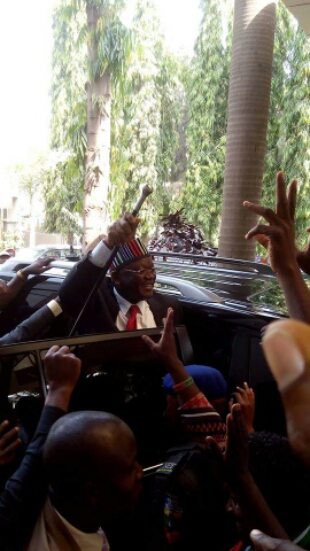By Gurgur Japheth
October 23rd, 2000, Oputa Panel began sitting officially, by February 3rd 2003: IBB got a favourable judgment from the Supreme Court that the Panel had “no powers to summon witnesses outside the Federal Capital Territory” and further “that the 1999 Constitution made no provision for tribunals of inquiry”. Till date, as far as shocking and useful the revelations in the Oputa Panel were, the reports are yet to be published and those indicted are yet to be punished accordingly.
As if the script of IBB versus Okputa Pannel was being mimicked, Justice Iorhemen Hwande in a preliminary order suspended the operations of the both panels pending the determination of the substance of the matter. However, Justice Adam
Onum in her final determination of the matter set aside the order placed on both panels. The Court held that the commission could resume sitting with immediate effect with a caveat that although it has the right to issue letters of summons on individuals, it is not vested with the power to issue a warrant of arrest on anyone or impose a fine (Berger Alfred MO, 2015)
What is not contestable is the facts that maybe contained in the report, and facts do not really need the imprimatur of a judicial panel or judicial commission to be useful in court of law. What is happening to the Dasukigates: Oliseh Metuh, Dokpesi, Patrick Ziakede Akpobolokemi etc is purely based on facts submitted to the EFCC. And so far, Nigerians are happy with the process and proceedings.
Justice Kpojime Commission will therefore do good to without delay, publicly submit its report in a transparent manner in order not to appear as another “Oputa Panel”. The essence of this is that such a compendium of exposition would not only enrich the literature on graft but also stand as panacea to the ethos of probity and accountability, which are sacrosanct ingredients of good governance.
Finally, the most altruistic reason why the commission’s report should not be further delayed is the fact that in the face of a damning poverty index of more the 1 out of every 3 indigenes being poor according to NBS 2015, Benue can not afford to ignore her meagre resources frittered away into private pockets of undeserving criminal elements on regrettable sabbatical in public office.
Governor Samuel Ortom must be encouraged and reminded to comply strictly to the Social Contract of April, 2015, re echoed on May 29th, 2015. And his mantra: “If You Chop Money, Money Will Chop You”! The 2016 budget of Benue State is just N133billion, which is less than the N197Billion allegedly stolen by criminals on sabbatical in government. In that sequence, Benue must be reconstructed after reconciliation of accounts, but most importantly, the reconciliation must come with restitution. The equilibrium point between reconciliation and restitution is the fulcrum of change which will lead to wholistic reconstruction. With this, salaries, pensions and projects would be funded and Benue rid off of unnecessary protests and activism. Poverty, hunger, corruption have no political party, religion, region or tribe and tongue.
Barka Da Sunday!
Gurgur Japheth is the Senior Special Assistant to the Benue State Governor on Administration
Admin

